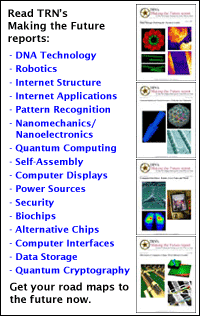
Computer
follows video action
By
Eric Smalley,
Technology Research NewsTeaching a computer to watch video is a lot harder than it might seem. What is obviously a face or a car or a sunset to us is often a confusing blur of shadows, colors and shapes to the computer.
Although computers are good at recognizing light, dark and color, and they do a reasonable job of picking out objects in still images, they get lost when objects move around. This is because the appearance of a moving object is constantly changing.
The key to giving computers a decent shot at following the action in a video is getting them to track the objects.
A team of researchers at the University of Amsterdam in the Netherlands has come up with an object-tracking technique that works by capturing the essence of a video object rather than just relying on its shape.
The underlying assumption of most video object tracking research, which focuses on the position and pose of an object, is that the object's appearance does not change much, said Marcel Worring, an assistant professor of computer science that the University of Amsterdam.
In contrast, the researchers' approach makes a full assessment of an object by monitoring every point, or pixel, associated with it. This makes it easier for the computer to recognize that a face turned upward in the sun is the same a moment later when it is angled down and in the shade.
"Our contribution is to... track the changes in appearance of every part of the object," said Worring. "In practice this means that we track changes in pixel values that belong to the object." Those pixel changes can be due to changes in lighting and the orientation of the object, and whether the object appears to have moved closer or farther away, he said.
By keeping track of the state of each pixel that makes up an object, the system is also better able to keep tabs on the object when it momentarily disappears, said Worring.
Like other object-tracking techniques, the researchers' system uses a cycle of measuring an object, predicting where the object will be next, using the prediction to narrow the area to be measured, and using the measurements to improve the prediction. When the measurements are completely off from the prediction, it usually means the object has disappeared from view.
"The system detects that the object has been lost by observing that the prediction becomes totally useless," said Worring. "It then... keeps doing a search in the neighborhood of the old position till the object reappears. At that point the tracking continues." Tracking the whole of an object rather than just its shape makes the researchers' system more efficient at recognizing when an object has disappeared, which gives it a better chance of picking up the object when it reappears, he said.
The system could be used for creating video hyperlinks, tracking faces to select the best view for face recognition, and tracking cars, said Worring. "The current system has to be tested thoroughly, but we expect it to be ready for practical use within a year," he said.
The algorithm is useful, said Aggelos K. Katsaggelos a professor of information technology at Northwestern University. "It's a nice combination of template matching and temporal prediction."
Worring's research colleagues were Hieu T. Nguyen and Rein van den Boomgaard of the University of Amsterdam. They presented the research at the International Conference on Computer Vision in Vancouver, July 9 to 12, 2001. The research was funded by the Dutch Organization for Scientific Research.
Timeline: <1 year
Funding: Government
TRN Categories: Computer Vision and Image Processing
Story Type: News
Related Elements: Technical paper, "Occlusion Robust Adaptive Template Tracking," International Conference on Computer Vision, Vancouver, July 9 to 12, 2001
Advertisements:
December 5, 2001
Page One
Nerve-chip link closer
Inside-out gem channels light
Computer follows video action
Environment may dictate intelligence
Physics methods may spot intruders
News:
Research News Roundup
Research Watch blog
Features:
View from the High Ground Q&A
How It Works
RSS Feeds:
News
Ad links:
Buy an ad link
| Advertisements:
|
 |
Ad links: Clear History
Buy an ad link
|
TRN
Newswire and Headline Feeds for Web sites
|
© Copyright Technology Research News, LLC 2000-2006. All rights reserved.